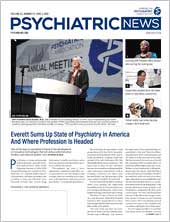African-American psychiatrists must unite in the struggle to help their patients—and themselves—overcome many of the same challenges today that confronted Solomon Carter Fuller, M.D., a century ago, said Patricia Newton, M.D., M.A., M.P.H., as she received the APA award named in Fuller’s honor at APA’s 2018 Annual Meeting in New York.
Fuller is celebrated as the first African-American psychiatrist. He worked closely with Alois Alzheimer and Emil Kraepelin in Germany, and he spoke at the same Clark University conference in 1909 where Sigmund Freud delivered his only U.S. lecture. The award is given each year to recognize a black citizen who has pioneered in an area that has significantly improved the quality of life for black people. Newton is semi-retired in private practice and serves as the CEO and medical director of the Black Psychiatrists of America.
Despite his many accomplishments, said Newton, “Fuller faced microaggressions in medical education and discrimination in pay, status, and academic tenure.” Despite 20 years on the faculty of Boston University, Fuller was never promoted to full professor, she said.
African-American patients then and now too often face subtle and blatant forms of discrimination, she said. Cultural factors are often dismissed during assessment, leading to misdiagnosis and ultimately to inadequate or inappropriate treatment. She cited the example of one otherwise mentally healthy man who spoke to his doctor about the “visitation” of his recently deceased wife and was immediately diagnosed and medicated as psychotic.
In addition, African-American children too often find themselves on a “school-to-prison” pipeline that begins with differential discipline early in their school years, said Newton. Suspension rates for black girls are six times that of their white counterparts, while for black boys it is three times higher. Minority children with disabilities are 25 percent more likely to be suspended from school.
“In addition, African-American children are perceived as older than they are and thus more responsible for their behavior and so punished more harshly,” tracking them toward the criminal justice system rather than the educational or health care systems, she said.
In preparation for her lecture at the Annual Meeting, Newton conducted an informal, three-question survey of 350 people at a large Baltimore shopping mall, a location primarily visited by African Americans. She asked about mental illness in the respondents’ families and what they thought were the most significant challenges facing people with mental illness as well as the most significant challenges facing doctors who provide mental health services.
Many of her community respondents said they had some family experience with mental illness. Nearly all said the major challenges to mental health were alcohol, drugs, and gang violence; police brutality and mass incarceration; and unemployment. They also said that there were not enough doctors or other clinicians who understood their culture and too few of them evinced concern for the general well-being of their patients. They also complained that physicians were trained only to hand out medications and not to talk to patients.
Newton also questioned her colleagues, sending a similar questionnaire to 350 black psychiatrists. They complained of poor access to care for their patients, inadequate wraparound services, and incarceration of black people with mental illness.
Interestingly, different age cohorts used different semantics to discuss these problems. Fifty percent of the senior psychiatrists used the words “racism” and “discrimination” in their responses, but none of the early- or mid-career psychiatrists did so. All face the same problems but communicate it differently, she said.
“Many [older psychiatrists] feel that their younger colleagues do not recognize [discrimination] when they see it and tend to internalize these issues as personal faults rather than systemic practices,” Newton explained in an interview. “The early career and mid-career psychiatrists have different language and seem more apprehensive about using terms like ‘racism’ and ‘discrimination’ because they are often viewed as being ‘offensive.’ ”
The senior psychiatrists believed that this is primarily due to the lack of minority supervisors and senior colleagues who could help younger colleagues navigate situations that often leave them dumbfounded, anxious, depressed, and confused, she said.
One common theme connecting African-American psychiatrists and patients was a shared history of trauma from the days of slavery through the Jim Crow era to the present day, said Newton.
“We are traumatized people treating traumatized people,” she said. “We are the victims of microaggressions in our own institutions and organizations, and then we are attempting to help somebody else to work out their own mental disorders. It is time to rewire our neural networks.”
It may be time to rewire other networks, too. African-American psychiatrists need to be at the table when policy is being hammered out. She urged her listeners to join together to advocate for their patients, for their rapidly changing profession, and for themselves. ■

